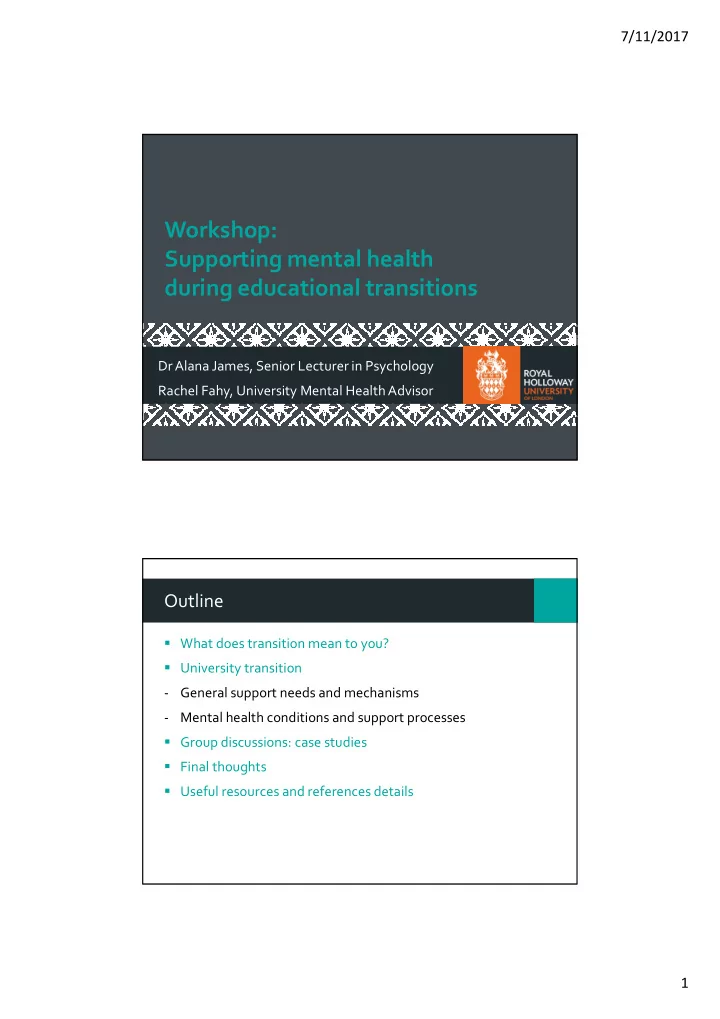

7/11/2017 Workshop: Supporting mental health during educational transitions Dr Alana James, Senior Lecturer in Psychology Rachel Fahy, University Mental Health Advisor Outline � What does transition mean to you? � University transition - General support needs and mechanisms - Mental health conditions and support processes � Group discussions: case studies � Final thoughts � Useful resources and references details 1
7/11/2017 What are your first thoughts when you hear ‘ transition ’? Write down 1 or 2 words on the post-its Get into a group and share your post-its - Are there any common themes? Why might mental health support be needed during transitions? 2
7/11/2017 University transition: general support needs and mechanisms Support needs Expectations Loss of support network of HE New academic Academic expectations integration New organisational Social integration hierarchies and goals Diverse new Who you live peer groups with New physical Background/ environment identity Pressures Influences on retention 3
7/11/2017 Support mechanisms before university � Talking to existing students is valued by, and can better prepare, entry students � Peer support schemes often recommended to support transition (see e.g. James, 2014; Briggs et al., 2012; Wilcox et al., 2005) Universities External � Mentoring schemes � Brilliant Club � Open days � Nuffield Research Placements � Taster courses � Higher Education � Residentials Opportunity Network Support mechanisms at university Department Campus life � Induction (all years) � Resident Assistants � Office Staff � Peer Support Schemes � Personal Tutoring � Wellbeing Advisors � Support/Disability Co-ordinator � Health Centre � Peer Tutoring � Counselling � Chaplaincy External � University Nightline � Student Minds � Students Against Depression 4
7/11/2017 University transition: mental health conditions and support processes Current climate for young people The number of 0-17 year olds admitted to A+E with a diagnosed psychiatric condition has more than doubled between 2010/11 -2014/15 (Burt 2016). 6,950-14,917. 9.6% of 5-16 year olds in 2011 had a clinically diagnosable condition (Layard, 2011). 7.7% 5-10 year olds, 11.5% 11-16 year olds. In 2014 (Tagart et al., 2014) Head teachers in secondary schools reported: 88% Self harm as an issue (increase of 57% since 2010). 87% Depression as an issue. 85% Eating disorders as an issue. 5
7/11/2017 The effects of this on HEI � The number of students with declared mental health conditions (diagnosed) has increased every year since 2008/9 in higher education. � This does not account for perceived need, i.e. reported/felt mental ill health or distress. � The number of students who drop out of University and are reporting mental health problems has trebled from 2009/10 to 2014/15 (HESA report). Transition to HE with a mental health condition Declare mental health condition (declare disability section) on UCAS form vs No declaration 6
7/11/2017 Group discussions: primary and secondary transitions Group Discussions: Case studies Pick one of the case studies and discuss: 1. In what key way(s) might transition be difficult for the young person? 2. How could their current school potentially prepare the young person? 3. How could the new secondary school/university potentially support the young person with the transition? School: Harinder University: Sarah Age: 11 Gender: Male Age: 19 Gender: Female Transition: Local primary school to grammar Transition: From secondary school in school about 20 mins away by bus Surrey to a university in London Concerns: Harinder got very worried about Concerns: Registered with CAMHS, doing well in the SATs. His best friend is diagnosed with anxiety. SpLD: Dyslexia going to a different secondary school. Only Current support: Learning support a few pupils in his class will be going to the assistant in classes where Sarah struggles same school. with her dyslexia. Enrichment group for Current support: No formal support students with anxiety 7
7/11/2017 Useful Resources – before university � Higher Education Outreach Network (HEON) - resources for pupils and staff about university support and preparation: heon.org.uk/resources/home � Nuffield Foundation – research placements for sixth-formers, including in university departments: www.nuffieldfoundation.org/Nuffield-research- placements � Brilliant Club – charity which links PhD students with state schools: www.thebrilliantclub.org/ � University of London Taster Courses – short subject-specific courses, usually incl. chance to meet current students: https://tasters.gradsintocareers.co.uk/ � Hackney University extension programme – taster courses for pupils at partner schools in Hackney: www.bsix.ac.uk/college/partners/universities.htm Useful Resources – university transition � Student support at Royal Holloway – general information: www.royalholloway.ac.uk/studentlife/supporthealthandwelfare/home.aspx � Students Against Depression – evidence-based information and resources: studentsagainstdepression.org � Nightline Association – network of confidential listening and support services by students for students: www.nightline.ac.uk � Student Minds – UK student mental health charity, runs student support groups: www.studentminds.org.uk � Charlie Waller Memorial Trust - resources for school and university staff: www.cwmt.org.uk/training � Disabled Students’ Allowances – government information: www.gov.uk/disabled- students-allowances-dsas/overview � Recovery College – NHS educational support workshops for carers, friends, and individuals with mental health difficulties: http://www.sabp.nhs.uk/recovery/recovery-sabp/recovery-college 8
7/11/2017 References Briggs, A. R. J., Clark, J., & Hall, I. (2012). Building bridges: understanding student transition to university. Quality in Higher Education , iFirst article, 1-19. Burt, A. (2016). Answer, ‘Mental Health Services: Children: Written question – 25146’, webpage. http://www.parliament.uk/business/publications/written-questions-answers-statements/written- question/Commons/2016-02-01/25146/ IPPR. (2016). “Education, education, mental health: Supporting secondary schools to play a central role in early intervention mental health service”. http://www.ippr.org/publications/education-education-mental- health James, A. I. (2014). Cross-age mentoring to support A-level pupils' transition into Higher Education and undergraduate students' employability, Psychology Teaching Review , 20 (2). Special Issue: Pedagogical action research. ISSN: 0965-948X Layard, R. (2011). ‘Time for Action’, New Scientist, 210(2808). Taggart, H., Lee, S., McDonald, L. (2014). Perceptions of wellbeing and mental health in English secondary schools: a cross sectional study, Centre Forum. http://www.centreforum.org/assets/pubs/headteacher- survey.pdf Wilcox, P., Winn, S., & Fyvie-Gauld, M. (2005). ‘It was nothing to do with the university, it was just the people’: the role of social support in the first-year experience of higher education. Studies in Higher Education, 30 (6), 707-722. Final thoughts? Any final practices points, ideas, or resources to share? Any thoughts you are taking away from the workshop? 9
7/11/2017 Thank you for participating! Alana.James@rhul.ac.uk @DrAlanaJames Rachel.Fahy@rhul.ac.uk @RH_DDS 10
Recommend
More recommend